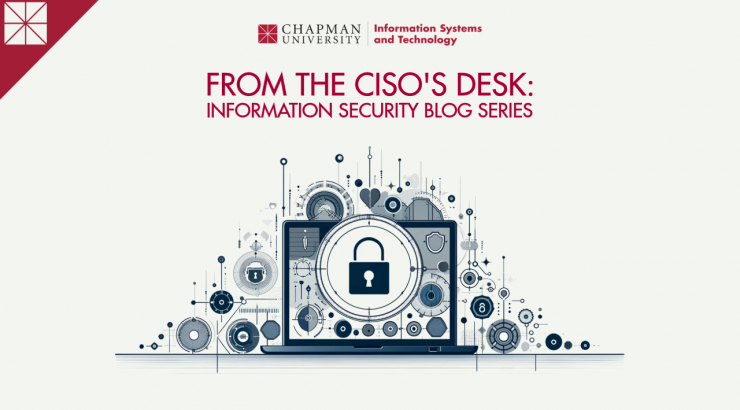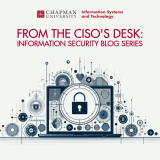
Staying Cyber Safe During Summer Vacation
July 12, 2024
As the summer season approaches, many of us are eagerly planning our vacations. Whether you’re heading to the beach, exploring new cities, or simply enjoying a staycation, it’s essential to prioritize your cybersecurity. As a Chief Information Security Officer (CISO) at Chapman University, I’ve seen firsthand the impact of cyber threats on our community.
Here are some practical tips to keep your digital life secure during your summer break:
- Update Your Devices and Software: Before you embark on your vacation, ensure that all your devices—laptops, smartphones, tablets—are up to date. Regularly check for software updates and security patches. Cybercriminals often exploit vulnerabilities in outdated software, so staying current is crucial.
- Secure Your Home Network: If you’re working remotely or accessing university resources during your vacation, ensure your home network is secure. Change the default password on your router, enable WPA3 encryption, and consider setting up a separate guest network for visitors. Remember that your home network is the gateway to your digital world.
- Be Wary of Public Wi-Fi: While sipping coffee at a local café or waiting at the airport, you might be tempted to connect to public Wi-Fi. Be cautious! Public networks are often unsecured, making them prime targets for hackers. If you must use public Wi-Fi, consider using a virtual private network (VPN) to encrypt your internet traffic.
- Protect Your Personal Information: Avoid oversharing on social media. Posting your vacation plans, location, and photos in real time can attract unwanted attention. Cybercriminals may use this information for phishing attacks or even physical break-ins. Share your memories after you return home, not while you’re away.
- Enable Multi-Factor Authentication (MFA): MFA adds an extra layer of security to your accounts. Enable it wherever possible—email, social media, banking, and university systems. Even if someone steals your password, they won’t be able to access your accounts without the second authentication factor.
- Backup Your Data: Imagine losing all your vacation photos or important documents due to a cyber incident. Regularly back up your data to an external drive or a secure cloud service. This way, you won’t lose precious memories even if your device is compromised.
- Educate Your Family and Friends: Share these cybersecurity tips with your family and travel companions. Remind them to follow best practices, too. A collective effort ensures everyone’s safety.
- Stay Skeptical: Beware of phishing emails, fake travel deals, and suspicious links. Cybercriminals often exploit our excitement about vacations. If something seems too good to be true, it probably is.
- Lock Your Devices: Don’t leave your devices unattended when sunbathing by the pool or exploring a new city. Use strong PINs, passwords, or biometric authentication to lock your phone, laptop, and tablet.
- Report Suspicious Activity: If you notice anything unusual—strange account activity, unexpected emails, or unauthorized access—report it promptly to abuse@chapman.edu. Your vigilance helps protect not only yourself but also the entire university community.
Remember, cybersecurity is a year-round commitment. Following these precautions lets you enjoy your summer vacation without compromising digital safety.
Stay safe, stay vigilant!
Keith Barros
Chief Information Security Officer (CISO)

